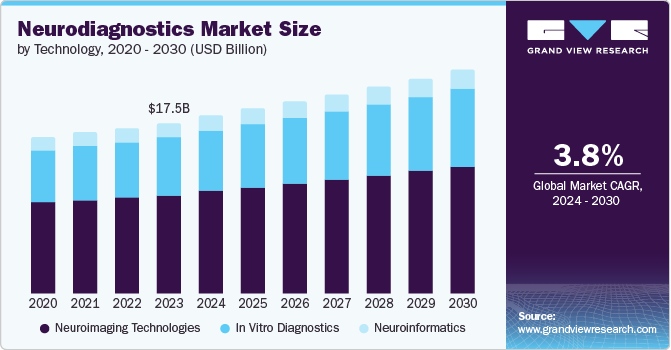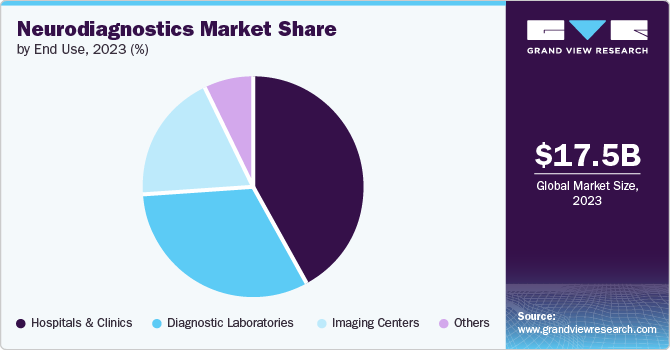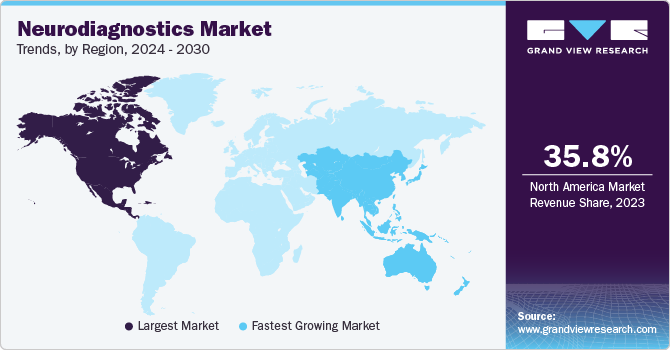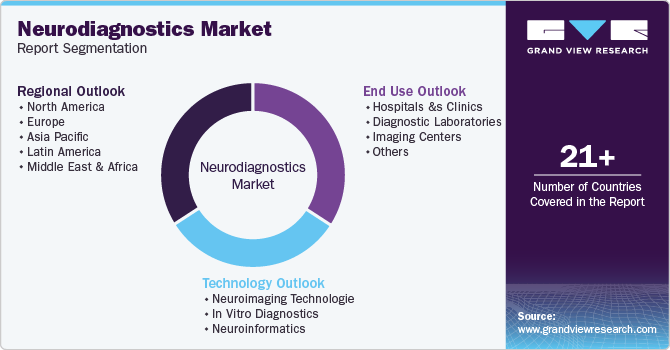
Neurodiagnostics Market Size, Share & Trends Analysis Report By Technology (Neuroimaging Technologies, In Vitro Diagnostics, Neuroinformatics), By End Use (Hospitals & Clinics), By Region, And Segment Forecasts, 2024 - 2030
- Report ID: GVR-1-68038-277-8
- Number of Report Pages: 120
- Format: PDF
- Historical Range: 2018 - 2022
- Forecast Period: 2024 - 2030
- Industry: Healthcare
Neurodiagnostics Market Size & Trends
The global neurodiagnostics market size was valued at USD 17.54 billion in 2023 and is projected to grow at a CAGR of 3.8% from 2024 to 2030. Advancements in neurodiagnostic devices, such as EEG machines, electromyography (EMG) devices, and neuroimaging equipment, are driving growth in the market. In addition, the increasing prevalence of neurological disorders, technological advancements, and new product development are further expected to drive growth in the market.

The prevalence of neurological disorders such as Alzheimer's disease, Parkinson's disease, and epilepsy is a key driver for this market. For instance, according to the Alzheimer's Association, approximately 6.9 million people in the U.S. aged 65 and over had Alzheimer's in 2024, which included about 73% of people aged 75 and older. This shows high prevalence of this disease among geriatric population.
According to an article published by the World Health Organization (WHO) in October 2022, approximately one in every six people worldwide is estimated to be 60 and over by 2030. This rising proportion of the geriatric population and their susceptibility to neurological disorders is likely to foster demand for neurodiagnostic drive growth in the market.
Furthermore, the market's expansion can be attributed to the company's intensified efforts in designing innovative imaging and diagnostic products aimed at facilitating better and earlier detection techniques. The advancement of cutting-edge imaging technologies such as Magnetic Resonance Imaging (MRI) and Computed Tomography (CT) scans have improved the precision and efficiency of diagnosis, further driving market growth. The rising awareness about the significance of early detection and treatment of neurological disorders is further anticipated to add to the market growth.
Technology Insights & Trends
The neuroimaging technologies segment dominated the neurodiagnostics market with a revenue share of over 57.9% in 2023. The advancements in neuroimaging technologies and the launch of new and innovative technologies by the key players in the market are further anticipated to drive market growth. For instance, in February 2024, Philips collaborated with Synthetic MR to introduce quantitative brain imaging in MR based on artificial intelligence. The Smart Quant Neuro 3D technology helps in the auto-measurement of different cells in the brain, facilitates decision support for brain diseases, and monitors the effect of therapy. The technology is expected to help in the advancement of neurology care for patients.
The in vitro diagnostics segment is expected to grow at the fastest CAGR of 4.2% over the forecast period. The IVD examinations offer significant insights into disease diagnosis, patient health monitoring, and treatment guidance. The advancement in technology, particularly in terms of portability, accuracy, and cost-effectiveness is further expected to drive segmental growth. For instance, in March 2024, Beckman Coulter and Fujirebio announced the expansion of their partnership agreement to facilitate the development of patient-friendly and blood-based neurodegenerative disease diagnostics. Such partnerships are likely to lead to the advancement of in vitro diagnostics in neurology and foster growth in the market.
End Use Insights & Trends
The hospitals and clinics segment dominated the market in 2023 with a revenue share of 42.3%. This is attributed to the preferred choice for many patients, positioning these facilities as the primary destination for such services. Furthermore, patients with neurological disorders often require continuous monitoring and follow-up appointments, leading to an increased demand for neurodiagnostic devices in these settings. The advancement of services by hospitals to improve diagnostics and care is further anticipated to drive market growth. For instance, in April 2023, Phoenix Children’s Hospital unveiled its expanded neurodiagnostic laboratory to improve comfort and care for children undergoing electroencephalogram (EEG) and electromyography (EMG) testing, sleep studies, and nerve conduction studies.

The imaging centers segment is to witness the fastest growth rate of 3.9% during the forecast period. This growth can be attributed to several factors, such as technological advancement, growing neurological disorders, and investment in and launch of neurodiagnostic centers. Integrating AI algorithms into neuroimaging analysis has revolutionized the interpretation of scans, allowing for quicker and more precise results. This advancement empowers clinicians to make well-informed decisions, ultimately enhancing diagnostic accuracy. For instance, in September 2022, Qure.ai, a health tech firm, partnered with University Medical Center Rotterdam and Erasmus MC to introduce an AI Innovation Lab for Medical Imaging. The innovation center is expected to explore the role of AI in detecting abnormalities for chest, and neuro, musculoskeletal conditions. The development of such innovation centers is expected to enhance the technologies at imaging centers further and drive market growth.
Regional Insights & Trends
North America dominated the market with a revenue share of 35.8% in 2023. The region's dominance can be attributed to various factors, such as a well-developed healthcare infrastructure, extensive research and development endeavors, and substantial healthcare spending. For instance, The Indiana NeuroDiagnostic Institute and Advanced Treatment Center (NDI) in Indianapolis is a USD 120 million, and a 159-bed facility opened in March 2019. The facility offers services related to acute and chronic mental illness, traumatic brain injury, neurodegenerative illnesses such as Alzheimer's disease, and other diseases.
In addition, the region witnesses a significant prevalence of neurological conditions, which fuels the need for neurodiagnostic procedures. The existence of robust healthcare systems, effective reimbursement frameworks, and proficient healthcare professionals also play a pivotal role in solidifying North America's position as a leader in the neurodiagnostics market.

U.S. Neurodiagnostics Market Trends
The U.S. neurodiagnostics market in the U.S. accounted for the market share of 26.9% in 2023 due to the increasing prevalence of mental, neurological, and neurodevelopmental disorders in the country. Strong regulatory framework and approval of various neurodiagnostic clinical trials are further anticipated to boost technological advancements in the country and foster market growth. For instance, in May 2023, the US FDA approved a clinical trial for Sense Neuro Diagnostics. The trial is aimed at Validating the algorithm for hemorrhage detection.
Europe Neurodiagnostics Market Trends
Europe neurodiagnostics market was identified as a lucrative region in this industry. The increasing occurrence of neurological disorders and the heightened attention on timely identification and management are fueling market growth. According to the information published by the European Commission, around 165 million Europeans have a brain disorder, and around one in three people are expected to suffer from a neurological or mental disorder in their lives.
The increased number of neurological disorders are also leading to the development and launch of new and innovative products in brain imaging, which is further expected to drive market growth. For instance, in February 2023, the Swoop, which is a portable MR imaging system developed by Hyperfine, Inc., received CE mark approval for brain imaging.
The UK neurodiagnostics market is expected to grow significantly over the forecast period as the increasing number of elderly individuals and the rising incidence of neurological disorders in the country have led to a surge in demand for improved diagnostic tools and techniques. According to The Neurological Alliance, about one in six people in the country suffer from at least one neurological condition. In contrast, around 600,000 people in the country are diagnosed with neurological conditions per year. This is expected to drive the demand for neurodiagnostics in the country and foster market growth.
Asia Pacific Neurodiagnostics Market Trends
Asia Pacific region is expected to grow at the fastest CAGR of 4.5% over the forecast period. The rise in neurological disorders across the Asia Pacific region is a key driver for expanding the neurodiagnostics market. Advancements in neurodiagnostic devices are also playing a crucial role in the market's growth in this region. Significant investments by governments and private entities in healthcare infrastructure have improved access to neurodiagnostic services. In December 2022, an AI-backed neurological healthcare startup in India, In-Med Prognostics, raised USD 2.13 million in funding. The startup is engaged in neuro analysis, which is expected to help in the assessment of neurological disorders, including Dementia, Alzheimer's, and Parkinson's, at affordable prices. The emergence of such startups is likely to drive technological advancements and growth in the market.
China's neurodiagnostics market is expected to grow rapidly in the coming years due to the rise in the geriatric population and the growing occurrence of neurological disorders, which necessitates the development of advanced neurodiagnostic technologies. According to the study published in the National Library of Medicine in February 2023, as per the national cross-sectional study in China, around 15.07 million people aged 60 years and above living with dementia, which is about a quarter of all dementia patients worldwide.
Key Neurodiagnostics Company Insights
Some of the key companies in the neurodiagnostics market include Canon Medical Systems Corporation; Siemens Healthineers AG; Koninklijke Philips N.V.; and Thermo Fisher Scientific, Inc.; Vendors in the market are focusing on increasing their customer base to gain a competitive edge in the industry. Therefore, key players are taking several strategic initiatives, such as mergers and acquisitions, and partnerships with other major companies.
-
Canon Medical Systems Corp is a global company engaged in developing and distributing various medical diagnostic systems worldwide. The company’s major products include magnetic resonance imaging systems, computed tomography systems, magnetic resonance systems, ultrasound systems, and X-rays, And others.
-
Koninklijke Philips N.V. is a global company operating in the health technology sector. The company specializes in offering products and solutions related to diagnostic imaging, image-guided therapy, ultrasound, monitoring and analytics, enterprise diagnostic informatics, and others.
Key Neurodiagnostics Companies:
The following are the leading companies in the neurodiagnostics market. These companies collectively hold the largest market share and dictate industry trends.
- Canon Medical Systems Corporation
- Siemens Healthineers AG
- Koninklijke Philips N.V.
- Thermo Fisher Scientific, Inc.
- FUJIFILM Corporation
- Natus Medical Incorporated (Natus)
- Lifelines Neuro
- Advanced Brain Monitoring, Inc.
- NIHON KOHDEN CORPORATION.
- F. Hoffmann-La Roche Ltd
- GE HealthCare.
- Mitsar Co. LTD.
Recent Developments
-
In March 2024, Philips, in partnership with SyntheticMR, introduced an AI-based quantitative brain imaging system. The partnership is expected to help in the detection and analysis of several brain conditions, including multiple sclerosis, traumatic brain injuries, and dementia.
-
In March 2024, Neurophet introduced an AI-powered brain imaging analysis technology at AD/PD 2024. The technology is expected to help in the analysis of brain atrophy and white matter hyperintensities, which are found in the brain MRI of patients suffering from Alzheimer's disease. .
-
In February 2024, Philips launched the Azurion neuro biplane system at #ECR2024. The system is expected to help in speeding up and improving minimally invasive diagnosis and treatment of neurovascular patients.
Neurodiagnostics Market Report Scope
|
Report Attribute |
Details |
|
Market size value in 2024 |
USD 18.35 billion |
|
Revenue forecast in 2030 |
USD 22.99 billion |
|
Growth rate |
CAGR of 3.8% from 2024 to 2030 |
|
Base year for estimation |
2023 |
|
Historical data |
2018 - 2022 |
|
Forecast period |
2024 - 2030 |
|
Report updated |
August 2024 |
|
Quantitative units |
Revenue in USD million and CAGR from 2024 to 2030 |
|
Report coverage |
Revenue forecast, company ranking, competitive landscape, growth factors, and trends |
|
Segments covered |
Technology, End Use, and Region |
|
Regional scope |
North America, Europe, Asia Pacific, Latin America, MEA |
|
Country scope |
U.S.; Canada; Mexico; UK; Germany; France; Italy; Spain; Denmark; Sweden; Norway; Japan; China; India; Australia; South Korea; Thailand; Brazil; Argentina; South Africa; Saudi Arabia; UAE; Kuwait |
|
Key companies profiled |
Canon Medical Systems Corporation; Siemens Healthineers AG; Koninklijke Philips N.V.; Thermo Fisher Scientific, Inc.; FUJIFILM Corporation; Natus Medical Incorporated (Natus); Lifelines Neuro; Advanced Brain Monitoring, Inc.; NIHON KOHDEN CORPORATION.; F. Hoffmann-La Roche Ltd; GE HealthCare.; Mitsar Co. LTD. |
|
Customization scope |
Free report customization (equivalent up to 8 analysts working days) with purchase. Addition or alteration to country, regional & segment scope. |
|
Pricing and purchase options |
Avail customized purchase options to meet your exact research needs. Explore purchase options |
Global Neurodiagnostics Market Report Segmentation
This report forecasts revenue growth at global, regional, and country levels and provides an analysis of the latest industry trends in each of the sub-segments from 2018 to 2030. For this study, Grand View Research has segmented the global neurodiagnostics market report based on technology, end use, and region.

-
Technology Outlook (Revenue, USD Million, 2018 - 2030)
-
Neuroimaging Technologies
-
Computed Tomography (CT)
-
Magnetic Resonance Imaging (MRI)
-
Nuclear Medicine Imaging (PET, SPECT)
-
Near infrared spectroscopic imaging (NIRS)
-
Electro-encephalography (EEG)
-
Magneto-encephalography (MEG)
-
Voxel based morphometry (VBM)
-
-
In Vitro Diagnostics
-
Neuroinformatics
-
-
End Use Outlook (Revenue, USD Million, 2018 - 2030)
-
Hospitals &s Clinics
-
Diagnostic Laboratories
-
Imaging Centers
-
Others
-
-
Regional Outlook (Revenue, USD Million, 2018 - 2030)
-
North America
-
U.S.
-
Canada
-
Mexico
-
-
Europe
-
UK
-
Germany
-
France
-
Italy
-
Spain
-
Denmark
-
Sweden
-
Norway
-
-
Asia Pacific
-
Japan
-
China
-
India
-
Australia
-
South Korea
-
Thailand
-
-
Latin America
-
Brazil
-
Argentina
-
-
MEA
-
South Africa
-
Saudi Arabia
-
UAE
-
Kuwait
-
-
We are committed towards customer satisfaction, and quality service.
"The quality of research they have done for us has been excellent."




